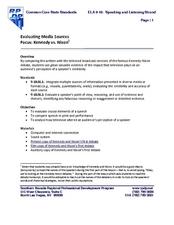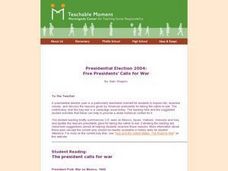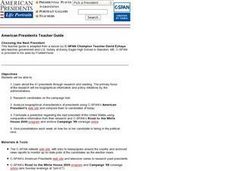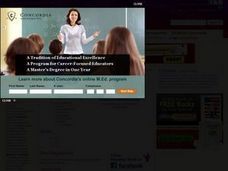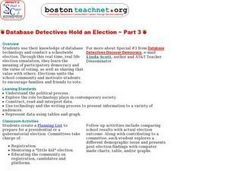Southern Nevada Regional Professional Development Program
Evaluating Media Sources
Just how much influence did television have on the results of the 1960 presidential election? Media critics contend that the results were all about how the two candidates appeared on the screen. Give your young historians a chance to...
Maryland Department of Education
The Concept of Identity Lesson 8: Propaganda in Visual Media
Visual and print propaganda are featured in a lesson that asks readers of A Separate Peace to examine the techniques used in propaganda from World War I, World War II, presidential elections, and in the novel.
Curated OER
Age of Jackson
Students work on political campaigns. For this campaign history lesson, students study the American presidential elections of 1824 and 1828. Students research primary and secondary sources to learn about the campaigns. Students then...
Curated OER
Making Informed Decisions
Students discuss various issues of importance in the 1998 congressional and gubernatorial elections, create comparison charts of their states' candidates' positions on these issues, and decide which candidate they would vote for based on...
Curated OER
Electing Economies
Students examine the economic and political challenges the past six presidents have faced during their terms of office, and how those challenges may or may not have impacted their chances for re-election. They create campaign slogans...
Curated OER
The Times, Are They A-Changing?
Students read and discuss article, "We Agreed to Agree, and Forgot to Notice," participate in anonymous mock presidential primary ballot, and share reactions to Iowa caucus results. Students then collect statements made by candidates on...
Curated OER
CIVICS AND HISTORY LESSON
Middle schoolers conduct research using recommended websites and other appropriate resources. Based on their findings, groups prepare recommendations for future elections to ensure efficiency and fairness. students must refer to the 2000...
Curated OER
Making Headlines
Students consider their personal opinions about the news and politics, read about the public relations drive behind the 2004 presidential election, and gather information for a press release promoting either Mr. Bush or Mr. Kerry.
Curated OER
Presidential Election 2004: Five Presidents' Calls for War
Pupils examine five president's reasons for entering into a war. Using the text, they answer questions and discuss their answers with the class. They also examine President Bush's reasons for going to war in Iraq and how that compares...
Museum of the Moving Image
Political Ads in Historical Context
Campaign ads target both timely issues and general themes. Presidential campaign ads from 1952 and 1988 provide class members an opportunity to compare how the topics ads choose to address can dramatically influence election outcomes.
Curated OER
How Laws Are Made
Learners create a graphic organizer to illustrate the steps elected representatives must take to make a new law. Included: Student work sheet and role-play ideas. Students use their graphic organizers to write a paragraph briefly...
C-SPAN
The Impact of Citizens United v. FEC
What began as an effort to show a movie by an interest group has impacted financing of federal elections. Did the Citizens United case lead to more "dark money" in politics, or did it shine a light with more speech? Using video clips...
Curated OER
Let the Campaign Begin
Students differentiate between positive and negative personal attributes and select a fictional character for nomination who personifies the qualities of a good leader. They use the Internet to learn about the election process and write...
Curated OER
The Economics of Voting
Students examine the voting behavior of people during a presidential election to determine costs and the benefits of voting and how this behavior is influenced by incentives.
Curated OER
Evaluation of Election Process
Young scholars examine the procedures to elect the President of the United States. In groups, they create their own political cartoon presenting a consensus of their point of views on the process. They identify the strengths and...
Curated OER
What's In Store for Four More
Students examine issues that they consider to be priorities and how President Bush might address them in his next term. They create public service announcement scripts motivating citizens to stay involved in these issues beyond the...
Curated OER
Presidents and the Constitution: George W. Bush and the Case of Bush v. Gore (2000)
Young scholars examine the impact of court decisions. In this Supreme Court lesson, students read the Bush v. Gore case study regarding the presidential election of 2000. Young scholars take notes on the case and respond to discussion...
Curated OER
Stand and Deliver
Students take a closer look at the presidential election of 2004. In this American politics lesson, students visit selected websites to learn about the 2004 campaign and active citizenship. Students then create personality...
Curated OER
Choosing the Next President
Students use comparative Internet research to formulate a prediction regarding the next president of the United States. They give presentations each week on how his or her candidate is faring in the political race.
Curated OER
Lincoln Home National Historic Site: A Place of Growth and Memory
Eighth graders study the history of Lincoln's home. In this American History lesson, 8th graders examine artifacts from his home to learn about his beliefs. Students participate in a webquest on Lincoln's home.
Curated OER
Primary Process in Elections
Students read "How Does the Primary Process Work" and complete the accompanying worksheet. They explore how the primary and caucus process works in small groups or in pairs. They answer questions based on the primary process to...
Curated OER
Elections for Elementary Students
Students explore various websites that explain how primaries, caucuses, and general elections function. They view sample ballots, and analyze the executive branch, U.S. presidents, and citizenship.
Curated OER
Database Detectives Hold an Election ~ Part 3
Students use a database to conduct a schoolwide election. They discover the importance of voting and democracy. They incourage one another to vote.
Curated OER
Presidential Campaigning
Eighth graders participate in a simulated presidential campaign by conducting research on the Internet. They define a party platform, run a campaign and write and deliver speeches in teams. Students can then act as the electoral college...
Other popular searches
- 2008 Presidential Elections
- Presidential Elections 1824
- 2io8 Presidential Elections
- 2oo8 Presidential Elections
- Presidential Elections of 08
- U.s. Presidential Elections
- Us Presidential Elections


